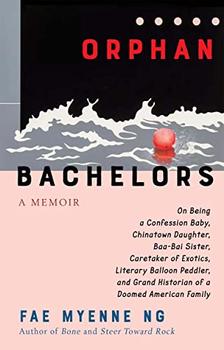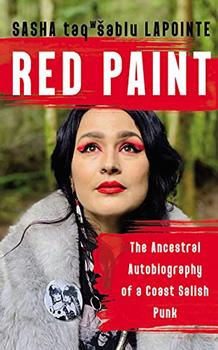Summary | Excerpt | Reviews | Beyond the book | Read-Alikes | Genres & Themes | Author Bio

A Memoir
by Fae Myenne NgThe focus of acclaimed fiction writer Fae Myenne Ng's memoir Orphan Bachelors is summed up aptly in its title. In the mid-to-late 19th century, Chinese men in the United States were viewed both as a source of cheap labor and a threat to the jobs of white men, while Chinese women were denied entry under the premise that their sexuality posed a threat to American marriage. Additional racist legislation soon suspended the entry of Chinese workers altogether, resulting in husbands, fathers and sons living alone in the country for decades. Through her own family, including her maternal great-grandfather, who worked as a miner in the States post-Gold Rush, and her father, who painstakingly memorized a fake identity in an attempt to immigrate, Ng looks at the long-ranging effects of this phenomenon. In a variety of ways, exclusionist laws created distance between family members, affecting her parents' marriage as well as the nature of her own relationships with her siblings.
None of the above, however, can sufficiently prepare the reader for Ng's strange, hilarious, highly specific accounts of her personal life, such as that of caring for her late brother Tim's pet tortoise Dewdrop, who she believes is a girl until his penis becomes enlarged due to a gallstone; subsequently, she calls him Mister Dewdrop. This story carries layers of meaning: Ng returns again and again to the idea of exclusion as a means of controlling the sexuality and reproductive choices of Asian people, a kind of metaphorical castration but also effectively as real as the operation Mister Dewdrop may be forced to undergo. In Orphan Bachelors, nothing is above a joke, but that isn't to say nothing is sacred. Humor is one tool that unlocks a sense of the life that flows through the author's existence and that of her family despite frequent stagnation. Along with her own experiences, Ng tells landmark, if little-known, stories of Asians and Asian Americans — such as that of Betty Ong, the Chinese American flight attendant who was the first to warn authorities of the September 11 attacks, and of Hong Kong graffiti artist Tsang Tsou-choi, known as the "King of Kowloon," whom Ng calls "an original Orphan Bachelor." In doing so, she creates a vivid tableau of past and current events with deftly connected dots.
While the book's tendency to switch streams frequently works well for Ng's particular storytelling style, and while it is clear her idiosyncratic approach is meant in part to mirror the limited grasp she has on her family history as well as her parents' own intent in how they told it, certain information gaps come across as lacking deliberateness, or as just odd. Notably, Orphan Bachelors connects pieces to reveal a broad picture of American anti-Asian racism, yet is missing vital context for how this specific form of racism has functioned alongside colonial genocide, slavery, anti-blackness and imperialism. For example, Ng writes of her Asian American students, "I don't want them to become America's new artillery—doctors, technicians, engineers, and lawyers—the new coolies who will fuel this country's economy," without clarifying what or whom she fears they will be weaponized against.
In the areas where it succeeds, Orphan Bachelors functions as both an account of injustice and a creative act of reclamation. Ng processes historical and current events through the media of stories and language; commenting, for example, on the absurdity of immigration organizations and laws being represented as cute and bubbly acronyms: "The laws and agencies responsible…have scary names that we say casually, like BYOB or TGIF: ICE, DACA, EVL." She recalls how her mother studied for the naturalization exam by memorizing English words transliterated into Chinese ones: in one case, remembering "We, the people" as "Wey dai pei bow (hey big butt treasure)." She writes enthusiastically of her love for Louis Chu's Eat a Bowl of Tea (1961), which recounts a newlywed wife's sexual awakening in a Chinatown bachelor society (see Beyond the Book).
Ng perceives Chu's novel as a kind of taking back of power for Chinese America, and this book, at its best, does something similar for a new generation with its humor and vulgarity and heart. If Eat a Bowl of Tea shows, as Ng suggests, an erotic revenge against efforts to desexualize Chinese Americans, Orphan Bachelors reads like compensation for the still-prevalent sanitized, stereotypical depictions of Asian Americans eager to earn their place through hard work and dedication to "family," a word that is today often used as a euphemism for the absence of sex ("family-friendly") or the absence of racialized people (as in, sometimes, "a good neighborhood for families"). Ng rejects this split between the family and the self, the family and the other, the family and the act that is frequently instrumental in creating it. Instead, she suggests that family separation and oppression have the insidious effect of stifling future generations' individual autonomy and desires — personal, creative, sexual — and that these things merit preservation and cultivation. Near the end of the book, she reflects:
"Our Orphan Bachelors believed that perfection and completion were false markers on the road. When working in the gold mines, on the railroad, in the galleys of ships, the underbellies of kitchens, and the basements of sweatshops, what's important is to hold something back for the self; this is our blood of hope."
![]() This review was originally published in The BookBrowse Review in July 2023, and has been updated for the
June 2024 edition.
Click here to go to this issue.
This review was originally published in The BookBrowse Review in July 2023, and has been updated for the
June 2024 edition.
Click here to go to this issue.

If you liked Orphan Bachelors, try these:

by Sabrina Imbler
Published 2024
A queer, mixed race writer working in a largely white, male field, science and conservation journalist Sabrina Imbler has always been drawn to the mystery of life in the sea, and particularly to creatures living in hostile or remote environments.

by Sasha taqʷšəblu LaPointe
Published 2023
An Indigenous artist blends the aesthetics of punk rock with the traditional spiritual practices of the women in her lineage in this bold, contemporary journey to reclaim her heritage and unleash her power and voice while searching for a permanent home.
Your guide toexceptional books
BookBrowse seeks out and recommends the best in contemporary fiction and nonfiction—books that not only engage and entertain but also deepen our understanding of ourselves and the world around us.